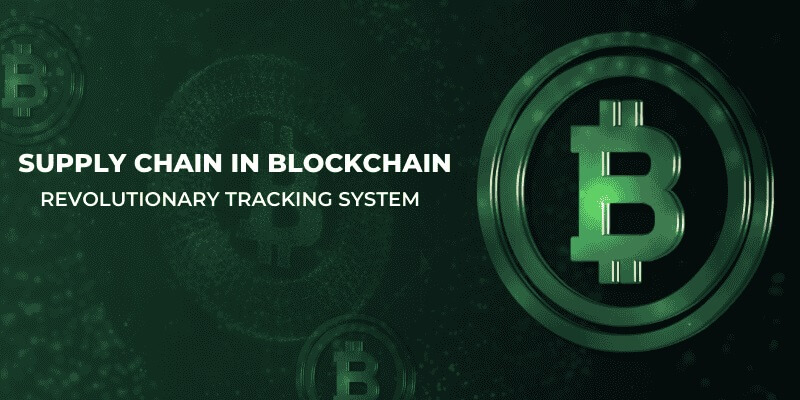In this article, you can read about the supply chain in blockchain—your brand’s supply chain efficiency and transparency count in today’s fast-moving business world. A new technology, blockchain, is revolutionizing the way you’re going to manage your supply chain. You get better informed on your operations along with supply chain transparency. If this occurs, it leads to smarter decisions and more profits.

A networked view of supply chains that span not just a city or country but rather the globe, visualized through interconnected nodes and chains that function in conjunction with transparent shipping containers, digital trackers, and flowing data streams, complete with futuristic urban scenes set against a sleek background sprinkled with blockchain elements and real-time tracking and traceability in bright, colorful hues.

Blockchain technology is a secure, open, and shareable way to manage your standardized supply chain data. It’s different from old databases in that it’s a permanent shared record of all transactions and movements. That means you can accurately see where your products went and know precisely how your operations are running.
What’s your first take on exploring blockchain for your supply chain? This can change how you keep track of inventory, reduce fraud or mistakes, and create better teamwork with your partners. By using blockchain, your supply chain will be more open and traceable. So, this bumps up your competitive edge in the market.
Understanding Supply Chain in Blockchain: Core Principles
Supply chain management is evolving due to blockchain technology. At its core are principles that make supply chains more efficient. Let’s explore these key aspects.
Distributed Ledger Technology Basics
Blockchain uses distributed ledger technology. This creates a shared, unchangeable record of all supply chain transactions. Every step, from sourcing to delivery, is documented and shared with all who need it.
This transparency builds trust and reduces fraud or errors. It makes the supply chain more accountable and reliable.
Smart Contracts and Supply Chain Integration
Smart contracts are a key part of blockchain in supply chains. They are digital agreements that automatically enforce transaction rules. Smart contracts can handle tasks like payment, inventory, and quality control, making the supply chain more efficient.
Real-time Data Tracking Capabilities
Blockchain means real-time data tracking. Sensors are tracking devices that monitor the movement of goods as they travel. This gives businesses a bird’ s-eye view of their goods’ location and status.
It makes for better decision-making and quick reaction to problems in businesses. It also optimizes operations.
Blockchain’s core principles stem from distributed ledger technology, smart contracts, and real-time tracking. These are the building blocks of blockchain-based supply chain solutions. These tools allow businesses to become more efficient, transparent, and trustworthy in their supply chains.
This is a view of the blockchain supply chain network, with products flowing from various logistical components (trucks, warehouses, and shipping containers). A glowing line represents the seamless flow of products. The background is a highly technological cityscape with vibrant colors that highlight the dynamic movement of goods through the blockchain decentralized system.
Transforming Supply Chain Transparency and Traceability
Our view of supply chains is changing thanks to blockchain technology. It gives businesses and consumers a clear view of products’ origin. Blockchain makes this possible because it can trace your goods and transactions from initial creation to delivery. Making records unchangeable makes blockchain better at supply chain transparency and gives consumers a clear view of where products come from. This is thanks to blockchain’s ability to track goods and transactions from start to finish.
Blockchain improves supply chain transparency by making records unchangeable. The blockchain records every transaction, recording what has been done permanently. It helps to fight counterfeiting; only genuine products live with the right to carry the Kerrygold logo; it helps to build trust with consumers.
Blockchain also allows us to track goods in real time, so we’re quick to spot problems and respond. Companies can better see their entire operation when blockchain is used with current systems. This helps them make better decisions and follow the rules.
With blockchain, companies like Walmart and Maersk have seen significant changes. Now, in seconds, not weeks, Walmart can see where food illnesses come from. With blockchain, Maersk cut costs and made its supply chain more efficient.
Just before this new era of unprecedented transparency and traceability about to change everything in supply chain management, Blockchain technology came on stage.
A growing list of companies is realizing how blockchain improves supply chain transparency. That means more people will use blockchain, which is opening up and making supply chains more open, efficient, and reliable for everyone.
Implementing Blockchain Solutions in Business Operations
If you run a small business, blockchain may need to be simplified to use in your supply chain. There is, however, a right way to do that. Doing this will let you control your business better and seem ahead of your competition. Let’s consider what to consider when implementing blockchain in a small business supply chain.
Cost Considerations and ROI Analysis
One big worry for small businesses is the cost of using blockchain. You must perform a thorough cost-benefit analysis. This means looking at the initial hardware, software, and setup costs. Also, long-term savings should be considered in how they will make things more efficient.
By checking the return on investment (ROI), you can see if blockchain fits your budget and goals.
Technical Infrastructure Requirements
When you add blockchain to your small business supply chain, you must consider the tech you’ll need. This might mean getting new servers and nodes or ensuring your network and software work with blockchain. It’s wise to collaborate with blockchain experts to ensure the process goes smoothly and safely.
Integration with Existing Systems
Integrating blockchain into your existing systems will help you manage your supply chain better and more efficiently.
Blockchain technology can change supply chain management with a strategic and well-planned implementation. Hold that thought because blockchain implementation in small business supply chains is one of those journeys. Hain better and more efficiently.
Blockchain technology can revolutionize supply chain management; however, its implementation should be made as a strategic decision in an organized manner. Remember, implementing blockchain in a small business supply chain is a journey. Also, we must consider the costs, what it takes regarding tech, and how it fits into our systems because it’s a black box.
Benefits and Challenges Along the Blockchain Supply Chain Management
The Future of Supply Chain Management Has Been Changed with Blockchain Technology. They started doing things differently, and it’s making a big difference. Now, we will examine the pros and cons of employing blockchain in supply chains.
The Case for Unlocking Efficiency and Transparency
Blockchain makes the supply chain more transparent and efficient. It employs real-time tracking of goods using its unique ledger. It reduces mistakes and improves the flow of information better.
This leads to quicker decisions and better control over inventory. It also increases the dependability of supply networks.
Enhancing Data Accuracy and Security
Blockchain is great for keeping data safe in supply chains. Its design makes it hard to change data once it’s recorded, lowering the chance of fraud and making data more reliable.
This trust in data can help partners work better together and more easily follow rules and regulations.
Navigating Scalability and Interoperability Challenges
But blockchain has its problems. It can get slow with too many transactions, and it is difficult to integrate with other systems.
As blockchain grows, leaders must find ways to overcome these issues. Solving these problems can unlock blockchain’s full potential, making supply chains more efficient, open, and strong.
| Benefits | Challenges |
| Increased efficiency and transparency Enhanced data accuracy and security Improved inventory management Streamlined decision-making | Scalability concerns Interoperability issues Lack of industry-wide standards Integration with existing systems |
Blockchain is making the future of supply chains look bright. Companies can improve their supply chains by tackling the challenging parts and using its benefits. They can become more efficient, open, and strong.
Sustainable Practices, Ethical Considerations
Blockchain technology is reimagining supply chains. It would help if you considered the benefits and disadvantages of this change. We must see how it affects workers’ rights and the environment.
Environmental Technology Assessment
One big worry is how blockchain will affect the planet. Running a mining and validation system consumes a lot of energy, which harms the environment. The point is for companies to find a way to lessen their impact on the planet.
Fair Trade and Worker Rights
Blockchain can help make trade fairer and protect workers. It makes it easier to see where goods come from and who made them, which helps ensure workers are treated fairly and get fair pay.
Data Privacy and Security Measures
Blockchain is secure, but it also raises privacy concerns. Companies need to protect personal and trade secrets and have strong security to keep data safe.
| Ethical Consideration | Sustainable Practice |
| Environmental Impact | Assess and mitigate the carbon footprint of blockchain-based supply chain initiatives |
| Fair Trade and Worker Rights | Leverage blockchain transparency to ensure fair wages and ethical labor practices |
| Data Privacy and Security | Implement robust data protection measures to safeguard sensitive information |
By tackling these issues, companies can use blockchain for good. They may enhance supply chains while being ethical to the environment and people.
Conclusion
Now, it’s the supply chain in blockchain, created with distributed ledger tech, smart contracts, and real-time tracking. These tools can make the supply chain more open and reliable, helping businesses improve and better meet customer needs.
Using blockchain, companies can smooth their supply chains and save money. They can also make more money from their investments. By adding blockchain to existing systems, we help teams work better together and make decisions based on facts. This results in a more efficient and stable supply chain.
Blockchain technology in supply chain management is developing rapidly. Supply chains tend to become more and more visible and flexible with new trends like IoT and predictive analytics. By pairing these technologies, we will get deeper insights, solve problems faster, and respond faster to market changes.
FAQ
How does blockchain enhance supply chain transparency?
By creating a shared, unchangeable record of every transaction on the Blockchain, Blockchain makes supply chains more transparent. It shows a record of what goes on from the beginning to the end of the journey of goods. It shows the business where a product came from, how good it is, and whether what it is, in fact, it.
Why is it advantageous to trace the supply chain using blockchain technology?
Tracking goods in the supply chain using blockchain has many advantages. It reduces fraud and makes everything more obvious. It’s also better than following rules; it keeps information more accurate and automates tasks. In short, this leads to quicker problems solved and better teamwork with partners.
What is a small business to do with blockchain in its supply chain?
Small businesses can start using blockchain in their supply chain by following these steps: 1. Which part of your supply chain can blockchain assist? 2. Don’t be surprised if you find out what tech you require, similar to hardware and software. 3. Discover how to tie your systems to the blockchain. 4. Costs to benefits; consider whether it’s worth it. 5. Try to work with your partners to ensure everything works. 6. Before you use it for everything, try out a small test to see how it works.
How can blockchain technology be ethically used in the supply chain?
However, introducing blockchain into supply chains raises ethical questions. Secondly, it uses so much energy that it can harm the environment. However, it can also help ensure products are made fairly and protect workers by revealing how goods are produced. However, data needs to be kept safe, and everyone who can must be able to use it.
With blockchain, what is the future of supply chain management?
Blockchain looks promising for future supply chains. Other techs like AI and IoT will use blockchain more, and when this happens, it will get better at tracking goods. In addition, we will see some other ways blockchain can help, such as inventory management and logistics. That will also enhance supply chains for sustainability and fairness.





